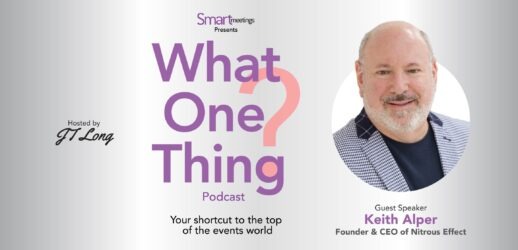Let’s lobby to change how meeting professionals are categorized to elevate our worth
The meetings industry is still relatively new. Not that events haven’t been happening since the dawn of time, but the arrival of agencies, full-service production companies, in-house event teams and even our titles, is still somewhat recent.
One signal that “meeting professional” is a new career track is the way government looks at us. We are usually grouped in the broad category of “hospitality,” which can include anything from small weddings to large-scale conferences. This affects us in the form of legislation that gets passed. One recent law in California only alluded to the event industry as hiring DJs and photographers for parties, clearly not understanding the impact that this legislation also had on trade shows and conventions. The disconnect extends to insurance companies as well, since trying to insure a business conference still often comes with a form asking if we are providing bouncy castles or other party accouterments.
Erroneous Comparisons Effect Value
What does this have to do with money? When categories are vague, broad and conflated with meaningless comparisons (birthday parties other than Oprah’s) then the value in the marketplace is broad and vague too. It means it is a landscape fraught with confusion over pricing that value and paves the way to statements such as: “I planned my wedding and I didn’t even get paid, so I can do your job.”
“One recent law in California only alluded to the event industry as hiring DJs and photographers for parties, clearly not understanding the impact that this legislation also had on trade shows and conventions.”
When this happens in a marketplace, we are in a race to zero. Whoever prices the lowest, wins, because after all, we can be compared to the lowest possible rung of our professional ladder, the one where work is done without experience or for free.
Racing Against Zero
How is this countered? The strongest argument to demonstrate value can be made in transparent pricing. In other words, just like the lawyer who prices by the hour at an incredibly high rate, you are not paying for the hour of time, but the volume of experience brought by that hour. This tells you immediately the value of that person’s experience and you are paying because you believe you will benefit from that rather than simply time spent.
Read More: Tips for Negotiating Your Next Big Event Contract
However, there is also the lawyer who prices on commission. They promise a win, or you pay nothing. If they do win, they get a piece of the proceeds at no risk to you. And then there are those who price with a mix: some upfront fee with collections on the back end as well.
In our industry? It’s not so clear-cut. This is largely due to the factors presented above, since our industry has been, I would argue, forced to show that our labor is “not expensive.” That has led to some of the more interesting pricing models we have today where pricing can be made up of a number of factors.
Building to Value
So what can be done? On an individual firm level, it is difficult if not impossible (we’ve tried) to convince clients that project management professionals are worth the real dollar value that they cost. If we added up hours on a project and multiplied that by our top producer, the cost would be staggering to most clients. For some firms, this means they focus on creative ways to get more money from the event in order to make up the real costs. For others, they drop their pay rates or profit margin to smaller and smaller numbers to make it work.
Read More: Price-Conscious Wow: How Meeting Planners Find More Value With AV Partners
It can be frustrating when low prices win, or when prices need to be hidden because the truth is inconvenient, but that is the frustration in any industry. What can help is professional association campaigns that educate on the value of producers and the number of years and training it takes to become one. Yes, it helps to market campaigns around the value of meetings, but we now need to talk about the people who make that happen.
This is not a hobbyist job. So, language from meeting associations needs to change to separate ourselves from any comparisons to a party planner and instead focus on the similarities we share with highly paid individuals like architects or general contractors. When that happens, the dollars following those comparisons will happen.
Lobbying
On another front, we can join lobbying organizations that are educating local and national legislators on the impact of business categorizations and the importance of differentiating conferences and professional events. I have just joined one such organization and know there are others out there doing similar work.
When I see a Bureau of Labor Statistics drop-down category that is more aligned with our industry, and when I fill out an insurance form that doesn’t ask about bouncy castles, I will know progress has been made—one that can affect all of our bank accounts positively.
—
 Heather Mason is CEO of Caspian Agency, a senior fellow and instructor at San Diego State University and Smart Woman in Meetings Hall of Fame winner.
Heather Mason is CEO of Caspian Agency, a senior fellow and instructor at San Diego State University and Smart Woman in Meetings Hall of Fame winner.
This article appears in the September 2023 issue. You can subscribe to the magazine here.




